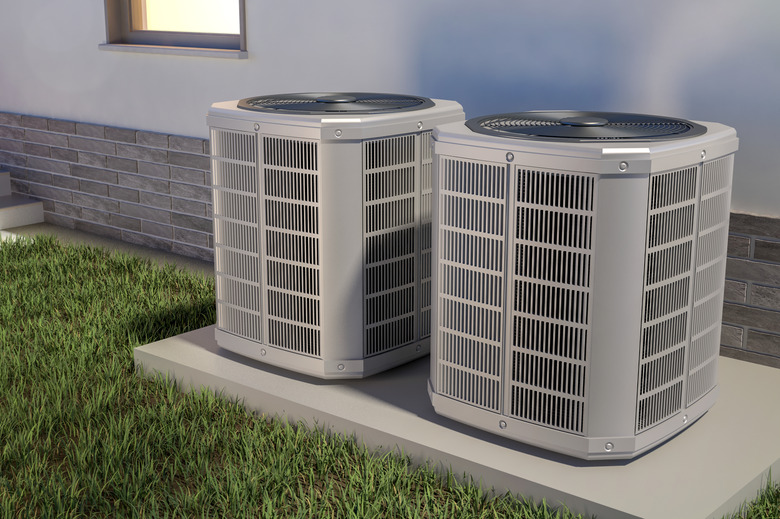How To Tell If A Heat Pump Needs Freon
Freon is a type of refrigerant, so it might seem somewhat paradoxical that a heat pump needs it to produce heat, but you can understand the mechanism by noting the air temperature behind your refrigerator when the compressor is running. It's warmer than room temperature because the refrigerator is exhausting heat from inside the refrigerator compartment. A heat pump works the same way, but it draws heat from the outdoor air and releases it into the house. Many heat pumps also have a cooling function; they draw heat from the house and dump it outside.
The heating or cooling process of a heat pump requires a refrigerant, which is a nonflammable liquid that can be repeatedly vaporized to remove heat from the surroundings and condensed back into a liquid to release the heat. If your heat pump runs low on refrigerant, the cycle will be less efficient, and the compressor will cycle on more often than it should. The end results are that your house doesn't get as warm (or cool, depending on the season), and your energy bill goes up.
Ice on the Evaporator Coils
Ice on the Evaporator Coils
A heat pump has two sets of coils — one outside and one inside — and if the unit doubles as an air conditioner, as most do, the functions of the coils change depending on whether the unit is heating or cooling the house. When it's functioning as a heat pump, the outside coils are evaporator coils and draw heat from the outdoor air, while the inside coils are condensing coils, and they supply heat that gets circulated by the blower.
If the heat pump is low on refrigerant, the evaporation cycle is incomplete, and moisture in the air can condense on the evaporator coils and freeze. You can access the coils by removing the condenser cover, and if you find ice, you shouldn't try to remove it yourself because the coils are fragile and easily damaged. When you remove the cover from the air handler, you'll probably notice that there isn't much heat coming from the condenser coils. Both are indications that it's time to call an HVAC service tech.
You Probably Don't Need Freon
You Probably Don't Need Freon
Freon is a brand name for the refrigerant developed in 1928 by researchers at DuPont, and as of 2020, it is no longer manufactured in the United States. Also known as R-22 refrigerant, it's a chlorofluorocarbon, which in the vapor state has been shown to migrate to the upper atmosphere and react with ozone, creating atmospheric holes that allow damaging ultraviolet radiation to penetrate. It won't be completely banned until 2030, but supplies are low, and safer alternatives exist.
Chances are that your heat pump already uses a Freon alternative. Only very old heat pump systems are designed to use Freon, and if yours is one of them, you may be able to use a substitute, such as R-407C, R-404A or R-410A. Some retrofitting might be required to make the changeover, and if it's extensive, it's because your system is old enough for you to consider replacing it with a more efficient model.
Keep an Eye on Your Energy Bill
Keep an Eye on Your Energy Bill
Your heat pump has to be dramatically low on refrigerant for the coils to ice over, and that's usually the sign of a leak that requires professional repair; you can't fix refrigeration equipment yourself. If a slow leak is just starting, there may be no dramatic signs, but you'll probably notice an uptick in your electric bill. If you can't attribute this uptick to anything else, it's a good idea to call for a tune-up. Besides deep cleaning the system and checking all the controls, a service tech will be able to test for leaks and stop them before they get serious.
